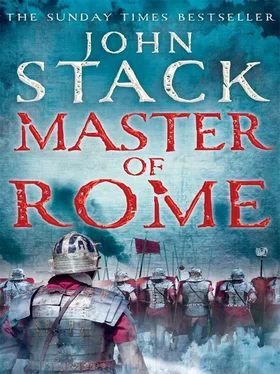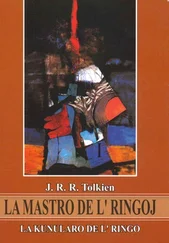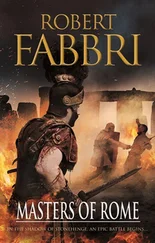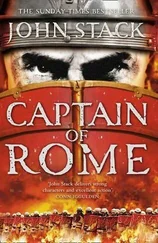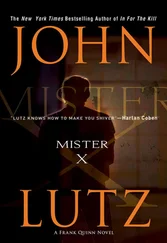John Stack - Master of Rome
Здесь есть возможность читать онлайн «John Stack - Master of Rome» — ознакомительный отрывок электронной книги совершенно бесплатно, а после прочтения отрывка купить полную версию. В некоторых случаях можно слушать аудио, скачать через торрент в формате fb2 и присутствует краткое содержание. Жанр: Исторические приключения, на английском языке. Описание произведения, (предисловие) а так же отзывы посетителей доступны на портале библиотеки ЛибКат.
- Название:Master of Rome
- Автор:
- Жанр:
- Год:неизвестен
- ISBN:нет данных
- Рейтинг книги:4 / 5. Голосов: 1
-
Избранное:Добавить в избранное
- Отзывы:
-
Ваша оценка:
- 80
- 1
- 2
- 3
- 4
- 5
Master of Rome: краткое содержание, описание и аннотация
Предлагаем к чтению аннотацию, описание, краткое содержание или предисловие (зависит от того, что написал сам автор книги «Master of Rome»). Если вы не нашли необходимую информацию о книге — напишите в комментариях, мы постараемся отыскать её.
Master of Rome — читать онлайн ознакомительный отрывок
Ниже представлен текст книги, разбитый по страницам. Система сохранения места последней прочитанной страницы, позволяет с удобством читать онлайн бесплатно книгу «Master of Rome», без необходимости каждый раз заново искать на чём Вы остановились. Поставьте закладку, и сможете в любой момент перейти на страницу, на которой закончили чтение.
Интервал:
Закладка:
Atticus stared down at his enemy, his thoughts still reeling from the fight, wondering why he had lunged forward to save Hamilcar from the legionary’s blade. Hamilcar saw Atticus’s hesitation and he tried to raise his sword, but Atticus swiped it away with a force that knocked the weapon from his hand and it clattered across the deck. Atticus brought the tip of his sword over Hamilcar’s chest but again he paused. The sounds of cheering and Roman trumpets signalling victory rang through the air.
‘What are you waiting for?’ Hamilcar demanded angrily.
Atticus searched his mind for the answer. Hamilcar was beaten, the fight was won, and although his battle lust called for the final strike, he could not deliver it. He thought of Gaius and Corin, of Lucius, and how they had always fought with honour. His enemy lay at his feet, unarmed, and for all the retribution his sword demanded, Atticus knew that if he killed Hamilcar now, the dishonour of slaying a defenceless foe would blacken the memory of the very men he had fought for. He lowered his sword.
‘It’s finished,’ he said and he stepped back.
Hamilcar tried to struggle up, his face etched in pain and anger.
‘You would spare me?’ he asked, the dishonour of absolute defeat robbing him of the will to survive the fight.
Atticus nodded, thinking once more of his fallen crew. ‘I will not kill an unarmed man,’ he said.
Hamilcar scoffed. ‘Is this Greek honour?’ he asked scornfully.
‘No,’ Atticus replied. ‘Roman.’
And he turned away, sheathing his sword as he did so, the base of the hilt slamming home against the locket of the scabbard, a solid strike that marked the end of the fight. He walked over to the side rail, stepping over the slain as he did, Roman and Carthaginian, their lives given in the final act of a bloody war. Beyond was the restless sea, its surface churned by a wind that swept the stench of battle from the air, its black depths oblivious to the fate of men who had fought to call themselves masters of its domain.
EPILOGUE
The chariots moved slowly through the petal-filled air, the horses nodding their heads skittishly as the deafening roar of the crowd washed over the triumphal march. The narrow streets were festooned with decorations and the spear tips of the legionaries brushed against the low hanging garlands, their ranks compressed by the cheering masses that lined the route to the Forum Magnum.
Caius Lutatius Catulus, the junior consul, rode in the van, his chariot succeeded by a hundred slaves, carrying aloft a single Carthaginian bronze ram as a symbol of his victory, a prize that would take a place of honour at the foot of the column raised by Duilius after his victory at Mylae. He wore a purple toga, a symbol of victory, and he raised his hand to the sound of trumpets as he emerged from the street into the Forum.
Behind the consul’s entourage, Atticus stood tall in his chariot with Septimus by his side, the IV of Ninth marching as a guard of honour in their wake, Drusus at the head of the maniple, his stern face at odds with the ecstatic expressions of the crowd. Both men were silent, any conversation impossible in the tumult, and they looked in awe upon the incredible outpouring of joy from the citizenry of Rome.
Carthage had been defeated and made subject to an unequal peace; the island of Sicily had been gained and the enemy forced to pay an indemnity of 2,200 Euboean talents each year for the next twenty years, a staggering sum that would fill the coffers of the city and end the taxes levied for the war.
The Roman prisoners taken at Tunis and Drepana had been returned, reuniting men thought dead with their families, while the Carthaginians had paid extortionate ransoms for the return of their own. Though many of them had already been returned to Africa, Catulus had insisted on delaying the departure of a select few so they could be paraded in his triumphal march.
Hamilcar marched at the head of this group, followed by the senior commanders and noble-born captains of his fleet. His head was held high, an outward display of pride that he could not marshal, and his gaze bored into the back of the Greek, Perennis, and the Roman centurion by his side. His father had paid a crippling sum for his release, a shame that went unfelt in a heart cauterized by defeat and ignominy. What remained was utter hatred, and Hamilcar felt his lungs burn with every breath he took of the cursed air of Rome.
The torment was pitiless, the crowds around him jeering and spitting curses in a language that had become abhorrent to his ear. His thoughts turned to home and his sons and how he would have to stand before them. Hasdrubal and Mago were too young to understand, but Hannibal was astute beyond his years and he would understand his father’s humiliation. It was a realization that fed Hamilcar’s hatred and he had already decided he would not shield his boys from the truth. In time they would all know of his hatred for Rome; it would become central to their characters, their ambitions and their loyalty. Carthage would always have enemies, in Africa, Iberia or beyond, but for Hamilcar, the Barcid clan would bay only for the blood of one people, the Romans, and he held close the hope that one day the sons of Hamilcar Barca would exact a terrifying measure of revenge in the name of Carthage.
Atticus stepped off the back of his chariot at the foot of the Curia steps. He began to ascend with Septimus by his side, the cheers of the crowd increasing as they recognized the commander of the fleet and his centurion. Their names were known throughout Rome, endlessly proclaimed by the orators hired by Duilius to stand at the corners of every Forum, and the crowd surged forward against the cordon of legionaries.
Atticus walked with his eyes upturned to the top of the steps and towards the assembled leaders of Rome: Aulus Postumius Albinus, the senior consul in the centre, Catulus by his side and, behind them both, Duilius, who nodded with a smile as he caught Atticus’s eye. Atticus had trod this path before, after the battle of Mylae, but so much had changed since then. On that day, Duilius had offered him a place by his side in the heart of the city, but Atticus had declined, believing he would never call Rome his home, that his destiny lay elsewhere. Now he was about to confound that belief and forever bind his fate to Rome’s. He turned at the top of the steps and looked out over the crowd, hearing his name amongst those shouted in celebration, the sound filling his heart with pride.
The senior consul stretched out his arms and the noise abated to a clamorous din. Albinus began his speech, his words reaching only those at the front of the crowd. He spoke of Catulus and the defeat of the Carthaginian fleet, of the strength of Rome and how none could stand against her, and how Sicily was merely the beginning of a new and incredible opportunity for the Republic to expand its borders across the sea that had once marked the boundary of their ambitions.
The crowd roared in support, their cheers rippling across the breath of the Forum, an infectious celebration that touched even those who could not hear the consul’s words. Albinus called for quiet once more and he ordered Atticus to stand before him.
‘Citizens of Rome, people of the Republic,’ he announced. ‘Today we honour one man who stands shoulder to shoulder with Consul Catulus, a man who commanded the fleet to victory and made safe the future of this city. For this deed and all others, I hereby declare Atticus Milonius Perennis to be a citizen of Rome of the equestrian class.’
Again the crowd roared in approval, their cheers reaching a crescendo as the senior consul took Atticus’s hand. Amidst the tumult, the senators nearest to Atticus offered their congratulations. Atticus smiled as Duilius stepped forward, knowing that the senator had orchestrated the endowment of citizenship, and they shook hands as they had many times before, as allies and friends. Atticus turned and sought out Septimus, the centurion shouldering his way through a knot of senators to reach his friend and they stood before each other.
Читать дальшеИнтервал:
Закладка:
Похожие книги на «Master of Rome»
Представляем Вашему вниманию похожие книги на «Master of Rome» списком для выбора. Мы отобрали схожую по названию и смыслу литературу в надежде предоставить читателям больше вариантов отыскать новые, интересные, ещё непрочитанные произведения.
Обсуждение, отзывы о книге «Master of Rome» и просто собственные мнения читателей. Оставьте ваши комментарии, напишите, что Вы думаете о произведении, его смысле или главных героях. Укажите что конкретно понравилось, а что нет, и почему Вы так считаете.
